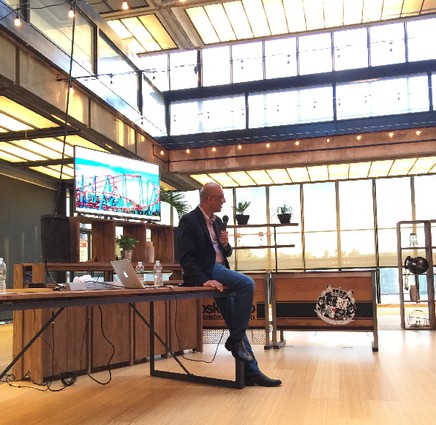Macwan Shares Lessons From Startup Founders at NJ Strategic Design + Tech Meetup

Those who have grown tired of climbing the corporate ladder will need to watch their step if they enter the risky and unpredictable world of startups.
That’s some of the advice offered by Sanjay Macwan, who gave a presentation on June 7 called “Lessons from Startup CEOs” at a NJ Strategic Design + Tech meetup at Bell Works, in Holmdel.
Over the past eight years, Macwan, CTO and senior vice president at NBCUniversal Media Labs (Englewood Cliffs), has met with thousands of startups in the U.S. and abroad to learn what it takes to be successful in building a company and what pitfalls to avoid.
Aggressively Sell Your Ideas
In his meetings with entrepreneurs, venture capitalists and others involved in the startup world, Macwan was told that salesmanship is one of the most valued characteristics in creating and maintaining a money-making venture.
Startup founders must aggressively sell their ideas and themselves to investors, cofounders, employees and their families if they aspire to be the next Jeff Bezos or Bill Gates. “If you’re averse to that, then a startup is probably not your thing,” Macwan said.
Corporate Skills May Not Be Transferable
Macwan noted that many executives get the itch to start their own company because they have become bored, frustrated or no longer intellectually challenged by day-to-day corporate life. But he cautioned that the skills and experience executives attain while working for a large company may not be “very transferrable in the startup world.”
For instance, corporate executives going the startup route are in for a rude awakening when they realize that they have to do things once handled by underlings.
Macwan recalled an executive-turned-entrepreneur who quickly discovered the realities of startup life when he failed to spot an email from a prospect seeking to schedule a meeting. That mistake would probably have never happened at the former executive’s old company, where he had assistants handling his calls and scheduling his meetings.
Seek Family Buy-In Before You Launch
Many of the startups that met with Macwan had recommended that entrepreneurs seek approval of their idea from their families before launching a new and often a highly risky venture. This will help prepare new entrepreneurs for the physical and emotional toll that many startup founders and their families often endure while trying to build a company. “The most important thing is to get your family on board,” Macwan noted.
Failure might not be an option for startups, but it happens all too frequently, and sooner rather than later. Twenty-five percent of all new startups go out of business within the first year, and 50 percent of them go under within five years.
But the prospect of failure shouldn’t deter those who are ready to make their next career move. “If you have a brilliant idea that will change the world, then you should drop everything and go do it,” Macwan said.
He added that startup founders and venture capitalists said that an entrepreneur should continually test his or her idea for a startup, and monitor the startup’s progress, to ensure that it remains relevant and viable.
Surround Yourself With Employees Who Have Vision and Drive
They also warned that startup CEOs need to take a hard stance on evaluating their employees’ performance, according to Macwan. One major reason why startups go belly-up is because of their founders failure to oust employees who didn’t have the drive and vision that is required to grow a young company.
“If you don’t trust the team, get a new one,” Macwan said.
Startups that achieve their goals typically hold the view that building a scalable business requires patience, persistence and a lot of energy, Macwan said. “People who have done successful startups have a mindset that it’s a long journey or a marathon.”
Macwan, who is contemplating writing a book on what he’s learned about startups during his travels, believes that the United States is an ideal place for entrepreneurs to start companies, compared with other countries he has visited. “Very few places have this spirit of innovation,” he said. “That’s the beauty of America.”

